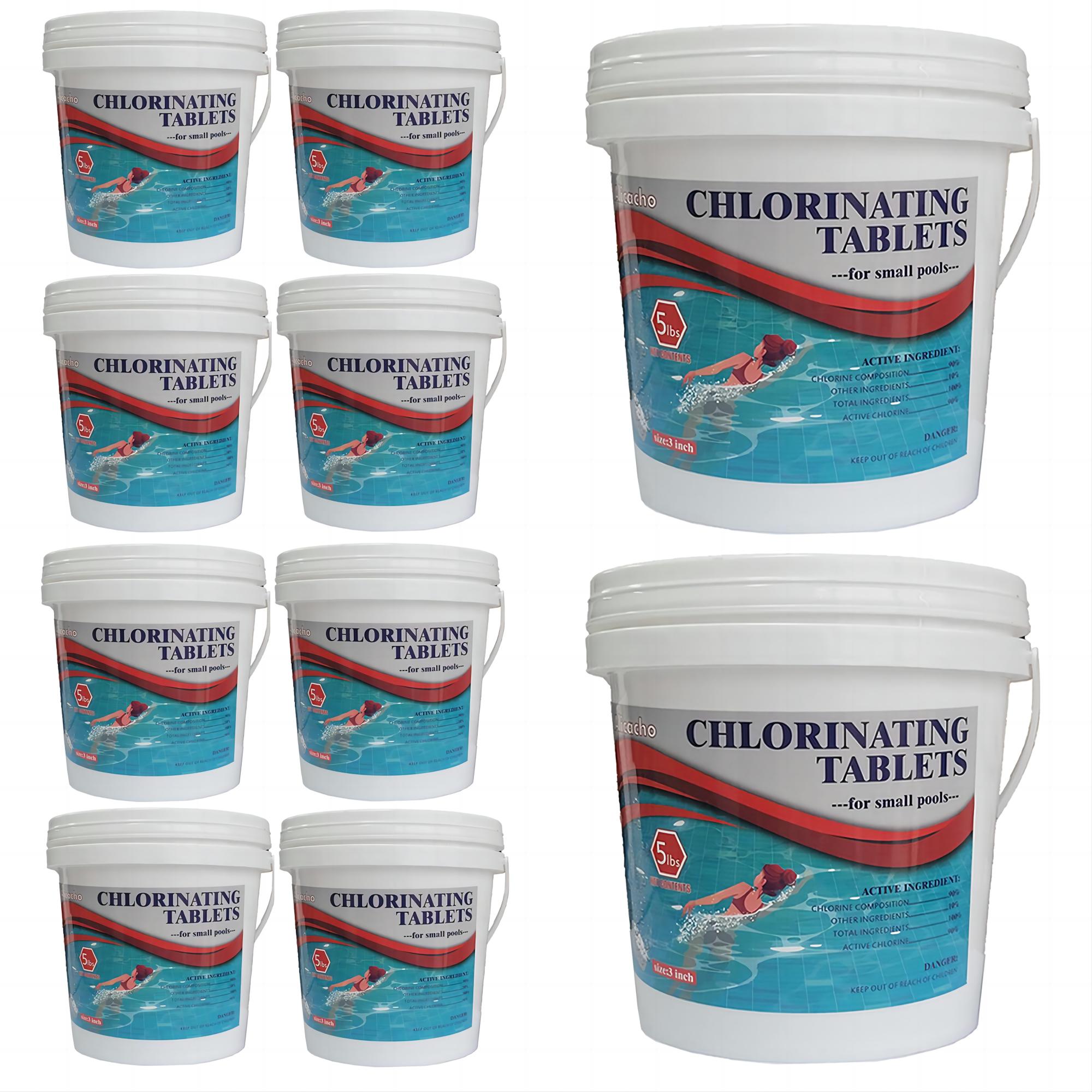There is nothing to worry about, it is not only you but lots of pool owners, who can’t do anything but ask, why can't I keep chlorine in my pool? Well, there are reasons for it, and to be able to solve the issue and not bring bad effects to the pool and bathers, all of which must be figured out and addressed.
It is also really frustrating to test your pool water, and have no reading for chlorine levels. You might want to get back and track your maintenance plans and records if there is something important that you have missed executing, or if there are other responsible factors.
For pool owners who have experienced this before, learned solutions from experience can be applied, however, the said situation can be confusing to new pool owners. This is why, in this article, we are going to discuss the different possible answers to your question, why can't i keep chlorine in my pool, and all the necessary actions to execute to be able to fix the dilemma as soon as possible.

Part 1. Why Can't I Keep Chlorine in My Pool?
One of the most important chemicals and components that must be maintained in a pool is the chlorine level. This sanitizer is really important to have a healthy, clean, and safe swim in the pool. This means that chlorine is not an unusual chemical for pool owners, and many have already experienced adding it to their pools as it is essential to its smooth and healthy operations.
There are reasons why you can’t keep chlorine in your pool, or why is there no chlorine level reading. By figuring out such reasons, devising a plan to create a solution would be easier and faster, helping you save your pool’s wellness the soon time possible. So, what are the possible reasons why pool owners wonder, why can't I keep chlorine in my pool?
1. Exposure of Your Pool Water to the UV Rays of the Sun.
One of the ultimate reasons for chlorine loss is when your pool water is too exposed to the harmful UV rays of the sun. This is most applicable to pools that are located outdoors since they are more exposed to sunlight. Once chlorine is exposed to UV rays, its ions begin to break down causing its destruction, and once chlorine burns, the level of its effectiveness as a sanitizer also goes down.
2. The Level of CYA or Cyanuric Acid is too High.
Although CYA can be good to add to your pool to be able to help chlorine stay, too much of it is also too bad for your pools. CYA will indeed protect your chlorine against the UV rays of the sun, however, it will also diminish chlorine’s ability to sanitize your pool water. When the CYA levels are too high, chlorine can be less effective and it can make your chlorine be locked up completely.
3. The Chemical Balance of Your Water is Unstable.
To maintain a nice pool, there should be harmony within your chemicals. Once your chemicals are imbalanced in levels and do not complement each other, it can be a major dilemma. This will require you to conduct testing of chemical levels weekly, and once it has become a part of your routine, achieving cleaner water is not impossible.
4. Too Many Organic and Inorganic Contaminants in Your Pool Water.
If you are going to analyze your pool and its water, the most common reason and answer to the question, why can't I keep chlorine in my pool, is the presence of too many organic and inorganic contaminants in your pool water. These contaminants will attack the chlorine present in your pool, and because of this chlorine will be used up, having its levels lowered. You have to check the sudden decrease in level since such a thing must happen gradually. To give you an idea of some of the contaminants causing chlorine loss in your pools, take a look at the list that we have below.
- Rainwater which affects the pH of your pool water and is closely related to levels of chlorine as well.
- The presence of leaves, twigs, branches of trees, and other organic matter can be considered as loads of contaminants and can cause the chlorine levels to drop faster.
- Organic chemicals from bathers like shampoos, lotions, soaps, inorganic hair products, and a lot more, contain chemical contaminants that will affect the balance of your pool water.
5. Presence of Heat that will Evaporate Your Pool Water.
Even if there is no sunlight, or you can’t see the sun, some days can be hot, and heat or the hot weather is enough to make your chlorine levels deplete faster. This heat will evaporate water out of your pool, and when there is a loss in pool water, it also means a loss in chemicals, like chlorine.
6. There are Too Many Bathers.
Another one of the most common reasons for chlorine loss is the presence of too many bathers. This could happen if you often host pool parties which will introduce high swimmer loads. This will introduce too many contaminants in your pool water, which will result in chlorine being used up faster as well.
These are only some of the answers to the question, why can't I keep chlorine in my pool, there are lots of pool practices which can be the reasons why the level of chlorine depletes faster than you have ever imagined.
Part 2. How do I Get My Pool to Hold Chlorine?
Now that some of the reasons why there is chlorine loss are already figured out, it is finally time to do something and make chlorine stay longer. In this part of the article, we are going to list some of the things that we can do to keep chlorine levels at an acceptable range.
The first thing that you have to do is to get a testing strip and measure the level of chlorine, you have to identify the level of free chlorine and total chlorine as well. To guide you, the level of free chlorine indicates the available level of chlorine that can help you disinfect and sanitize your pool, while the level of total chlorine is the overall level, including the amount that is used and not used in your pool water. If you have conducted a test, and the level of free chlorine matches that of the total chlorine, this means that your pool does not need a high chlorine demand. On the other hand, if the free chlorine level is different from that of your total chlorine reading, then there must be something that you have to look into.

To break your pool’s chlorine lock, you have to:
- Partially Drain Your Pool.
One of the options that you can try is to drain your pool partially. There is no definite level of water that you have to watch. You can just try to drain your pool little by little, then refill it, and start testing it for chlorine levels, you need to do the same procedures one by one until you can reach the ideal level of chlorine that is required in a pool.
- Shock Your Pool.
Another effective method is to shock your pool. Bringing the chlorine levels of your pool to three times higher than what you normally apply or put is called pool shocking. It is recommended that when you use this solution, use a non-chlorine oxidizing shock until you can see that the levels of total and free chlorine are finally the same.
- Buy the Solar Pool Covers
Invest in a high-end quality pool cover that will shield your pool from the harmful UV rays of the sun.
Part 3. FAQs
1. Why Does My Pool Chlorine Disappear Quickly?
As a pool owner, you would probably wonder why levels of chlorine in your pool continue to drop even if you are regularly monitoring it. Well, chlorine is not stabilized in form, and when it is exposed to sunlight, it degrades. You can start adding stabilizers to be able to make sure that the sun’s rays will have a lesser impact on the chlorine levels in your pool. The recommended level of stabilizer that you have to maintain is in the range between 30 and 150 ppm.
2. Do I Have to Add Chlorine to My Pool Every Day?
Well, the ideal practice that you have to do is to have regular monitoring of your chlorine levels. Once monitored well, you will know the most appropriate time to add chlorine to your pool. It is recommended that you execute pool shocking every two weeks depending on how heavily your pool is utilized. This will automatically raise the pH level, and it should also be done regularly, especially in sunny weather when chlorine can easily break down.is grayish or brownish in physical color.




